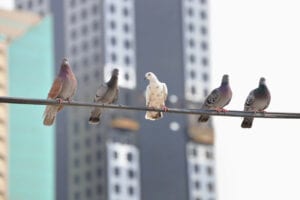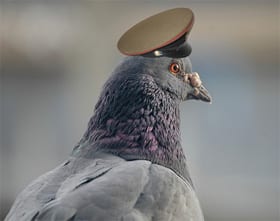
by Pigeon Patrol | Aug 3, 2021 | Bird Law, Bird Netting, Bird Spikes, Columbidae, Doves, history of pigeons, MBCA
In the third floor hallway of the Pentagon, just outside the Army Chief of Staff’s office, there is a pigeon.
Walking the corridors, the lifelike pigeon stands out among the cases of military history that display Revolutionary-era bayonets, Civil War uniforms and replicas of helicopters used in Vietnam. Upon closer inspection, one might notice the pigeon is so life-like because it has been taxidermied. It’s also missing one leg.
That pigeon’s name is “President Wilson” — an unsung hero of World War I that made a daring flight to save U.S. troops exactly 100 years ago on Friday.
President Wilson was a military carrier pigeon, one of many in the U.S. Army Signal Corps that delivered messages between commanders and troops on the front lines. The pigeons were especially useful tools of communication during World War I when the telephone and telegraph were still unreliable new technologies.
According to U.S. military accounts recorded in the U.S. Army Center of Military History and the National Archives, Wilson was born in France and first assigned to the U.S. Army’s newly formed Tank Corps, delivering messages to Tank Battalions commanded by Col. George S. Patton in the Battle of Saint-Mihiel.
But soon afterward, Wilson was assigned to an infantry unit conducting operations near Grandpré during the Meuse-Argonne Offensive.
On the morning of Oct. 5, 1918, his unit came under attack, and Wilson was dispatched to send a message that the unit needed artillery support. During the 25-mile journey, German soldiers spotted him and began firing into his flight path. (It should be noted that some accounts of Wilson’s heroics place the event as occurring on Nov. 5, but multiple historians reached by ABC corroborated the Oct. 5 date.)
Wilson was hit several times, losing a leg and suffering a wound to his chest, but he managed to deliver the message in a record 25 minutes.
Surviving his wounds, Wilson was retired and sent to the U.S. Army Signal Corps Breeding and Training Center at Fort Monmouth, New Jersey, where he would live another eleven years.
After his death, Wilson was taxidermied and presented to the Smithsonian Institution before being transferred to the custody of the U.S. Army in 2008. Now, located in the prestigious halls of the U.S. military’s headquarters in Arlington, Virginia, Wilson serves as a reminder that these simple birds — often considered a nuisance by the general public — were once war heroes.
Carrier pigeons were used by both the Allied and Central Powers during World War I and could even provide updates to military commanders when launched in midair from planes.
“Launched mid-mission, the birds would fly back to their coops and update ground commanders on what the pilots had observed,” the National Archives wrote in a blog post in January. “Quick updates like this were essential for leaders to know what the battlefield looked like and what the enemy was doing in its own trenches.”
“Tanks carried the birds in order to relay the advance of individual units. Even after the introduction of the radio, pigeons were often the easiest way to help coordinate tank units without exposing the men to dangerous fire. Without a radio set, the soldiers would have had to leave the relative safety of their tanks to relay or receive orders,” the Archives said.
When the pigeons weren’t in use, they were stored in mobile units, often converted horse carriages or even double-decker buses.
The birds are thought to use low-frequency sound waves to map their environments and find their way from location to location.
Another famous World War I pigeon was known as Cher Ami — his moment of heroism came during the Meuse-Argonne Offensive in the fall of 1918.
The German Army surrounded elements of the 77th Division for five days, at one moment confusing the Americans as they accidentally shelled their own men in an attempt to fire at the enemy.
Messages were unable to get to U.S. commanders, so Cher Ami was released as the division’s last hope. Like Wilson, Cher Ami flew through a barrage of gunfire, also sustaining injuries to his leg and chest. But he successfully delivered the message, ending the friendly fire.
The French even awarded Cher Ami the Croix de Guerre with Palm, a military decoration, for his service.
Military carrier pigeons were again used in World War II. In that war, 32 pigeons were awarded the United Kingdom’s Dickin Medal for their heroic actions.
Source
Pigeon Patrol Products & Services is the leading manufacturer and distributor of bird deterrent (control) products in Canada. Pigeon Patrol products have solved pest bird problems in industrial, commercial, and residential settings since 2000, by using safe and humane bird deterrents with only bird and animal friendly solutions. At Pigeon Patrol, we manufacture and offer a variety of bird deterrents, ranging from Ultra-flex Bird Spikes with UV protection, Bird Netting, 4-S Bird Gel and the best Ultrasonic and audible sound devices on the market today.
Voted Best Canadian wholesaler for Bird Deterrent products ten years in a row.
Contact us at 1- 877– 4– NO-BIRD, (604) 585-9279 or visit our website at www.pigeonpatrol.ca
Pigeon/Pigeon Patrol / Pigeons Roosting / Vancouver Pigeon Control /Bird Spikes / Bird Control / Bird Deterrent / Pigeon Deterrent? Surrey Pigeon Control / Pest /Seagull deterrent / Vancouver Pigeon Blog / Birds Inside Home / Pigeons in the cities / Ice Pigeons/ What to do about pigeons/ sparrows , Damage by Sparrows, How To Keep Raccoons Away, Why Are Raccoons Considered Pests/ De-fence / Pigeon Nesting/ Bird Droppings / Pigeon Dropping/ woodpecker control/ Professional Bird Control Company/ Keep The Birds Away/ Birds/rats/ seagull/pigeon/woodpecker/ dove/sparrow/pidgeon control/pidgeon problem/ pidgeon control/flying rats/ pigeon Problems/ bird netting/bird gel/bird spray/bird nails/ bird guard

by Pigeon Patrol | Aug 3, 2021 | Bird Deterrent Products, Bird Law, Bird Netting, Bird Spikes, Columbidae, Doves
The feral pigeon (Columba livia) carries with it a reputation that runs counter to conservation: it is feral, exotic and invasive and even considered down right filthy. But upon closer inspection, the pigeon could be a subject worthy of study for both ecological and social science purposes and highlight the importance of urban species in ecology. This insight on pigeons occurred during an urban ecology study that focused on habitat and population dynamics of the birds and is also supported through an extensive literature review. As a nearly ubiquitous species, we discuss how important pigeons are as a prey-base for numerous raptors and underscore our position by highlighting several studies on the biological uptake of environmental contaminants that may have benefited from including the pigeon as part of the research. We further our stance on the importance of pigeons in urban ecology by highlighting additional concerns such as zoonotic disease and climate change. We expand our case by turning to the social construction of nature, the importance of public participation in conservation. Once again, the ubiquitous presence of pigeons lends itself well to citizen science in ecology and conservation, especially to show trends across a range of geographic locations. In short, this commentary strives to reconceptualize the feral pigeon, promoting the bird as a valuable asset to ecological and social research in ways that raise awareness for conservation concerns and advance our scientific thinking.
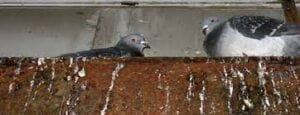
Source
Pigeon Patrol Products & Services is the leading manufacturer and distributor of bird deterrent (control) products in Canada. Pigeon Patrol products have solved pest bird problems in industrial, commercial, and residential settings since 2000, by using safe and humane bird deterrents with only bird and animal friendly solutions. At Pigeon Patrol, we manufacture and offer a variety of bird deterrents, ranging from Ultra-flex Bird Spikes with UV protection, Bird Netting, 4-S Bird Gel and the best Ultrasonic and audible sound devices on the market today.
Voted Best Canadian wholesaler for Bird Deterrent products ten years in a row.
Contact us at 1- 877– 4– NO-BIRD, (604) 585-9279 or visit our website at www.pigeonpatrol.ca
Pigeon/Pigeon Patrol / Pigeons Roosting / Vancouver Pigeon Control /Bird Spikes / Bird Control / Bird Deterrent / Pigeon Deterrent? Surrey Pigeon Control / Pest /Seagull deterrent / Vancouver Pigeon Blog / Birds Inside Home / Pigeons in the cities / Ice Pigeons/ What to do about pigeons/ sparrows , Damage by Sparrows, How To Keep Raccoons Away, Why Are Raccoons Considered Pests/ De-fence / Pigeon Nesting/ Bird Droppings / Pigeon Dropping/ woodpecker control/ Professional Bird Control Company/ Keep The Birds Away/ Birds/rats/ seagull/pigeon/woodpecker/ dove/sparrow/pidgeon control/pidgeon problem/ pidgeon control/flying rats/ pigeon Problems/ bird netting/bird gel/bird spray/bird nails/ bird guard
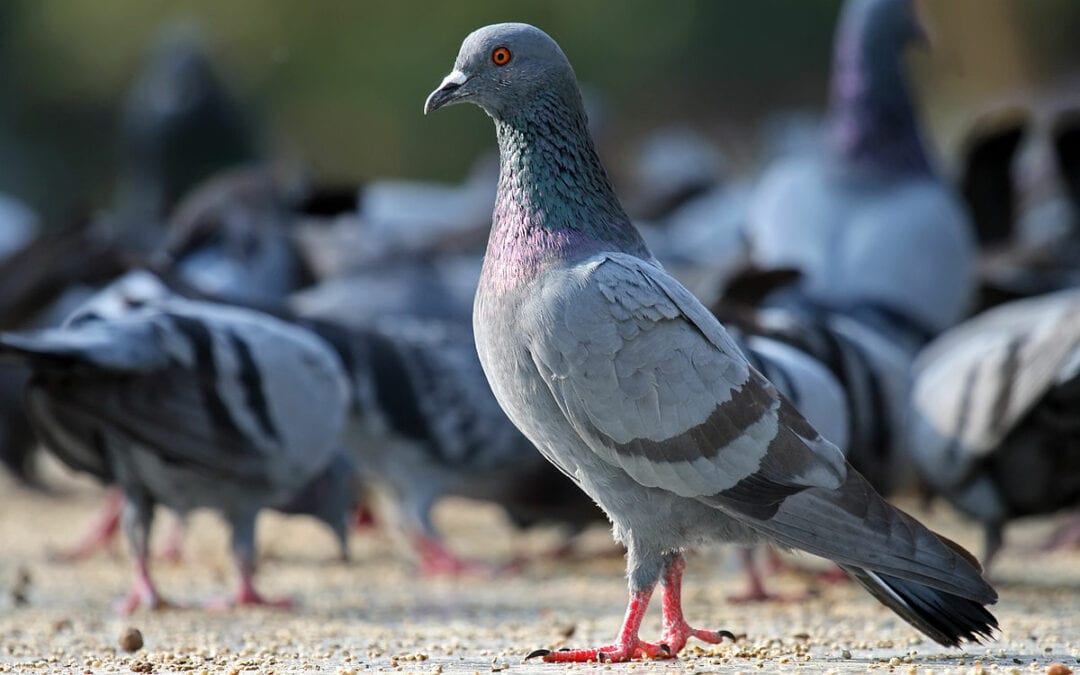
by Pigeon Patrol | Jul 27, 2021 | Bird Netting, Columbidae, Doves, Pigeons in the News, Raccoons, Sparrows
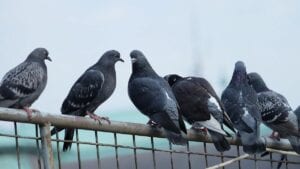
Pigeon shoots are examples of “contested traditions” that invite comparison with other controversial spectacles of killing animals, such as cockfights and dogfights. In the United States during the late twentieth century, mass protests of America’s largest public pigeon shoot occurred in Hegins, Pennsylvania. This article offers a folkloristic perspective on the contested tradition by analyzing how the protest rhetorically served to present tradition as a “problem” in the ethical modernization of society. The clash between animal rights protestors and supporters of the shoot became a moral drama based on a clash of rural and cosmopolitan values in modern America that derives from fundamentally different views of human dominion over the land and its creatures. The interpretation of the event hinges on a semiotic layering that takes into ethnographic consideration the different meanings of symbols for various participants in the event. Compromise became impossible in controversies over pigeon shoots because the sides perceived symbols so differently. For protestors, the shooters represented predatory, phallocentric rapists who promoted violence for its own sake, whereas, for supporters, they symbolized a pioneer and biblical heritage based on human dominion over the bountiful land. For protestors, the process of the ritualized shoot perpetuated cycles of abuse and patriarchy; for protestors, it acted to regenerate the land, confirming the wholesomeness of agrarianism. The pigeons could be symbolized as profane, dirty pests or sacred doves of peace. The widely publicized controversy implied larger questions, and fundamental conflicts in America, about the role of tradition in modernity.
Source
Pigeon Patrol Products & Services is the leading manufacturer and distributor of bird deterrent (control) products in Canada. Pigeon Patrol products have solved pest bird problems in industrial, commercial, and residential settings since 2000, by using safe and humane bird deterrents with only bird and animal friendly solutions. At Pigeon Patrol, we manufacture and offer a variety of bird deterrents, ranging from Ultra-flex Bird Spikes with UV protection, Bird Netting, 4-S Bird Gel and the best Ultrasonic and audible sound devices on the market today.
Voted Best Canadian wholesaler for Bird Deterrent products ten years in a row.
Contact us at 1- 877– 4– NO-BIRD, (604) 585-9279 or visit our website at www.pigeonpatrol.ca
Pigeon/Pigeon Patrol / Pigeons Roosting / Vancouver Pigeon Control /Bird Spikes / Bird Control / Bird Deterrent / Pigeon Deterrent? Surrey Pigeon Control / Pest /Seagull deterrent / Vancouver Pigeon Blog / Birds Inside Home / Pigeons in the cities / Ice Pigeons/ What to do about pigeons/ sparrows , Damage by Sparrows, How To Keep Raccoons Away, Why Are Raccoons Considered Pests/ De-fence / Pigeon Nesting/ Bird Droppings / Pigeon Dropping/ woodpecker control/ Professional Bird Control Company/ Keep The Birds Away/ Birds/rats/ seagull/pigeon/woodpecker/ dove/sparrow/pidgeon control/pidgeon problem/ pidgeon control/flying rats/ pigeon Problems/ bird netting/bird gel/bird spray/bird nails/ bird guard
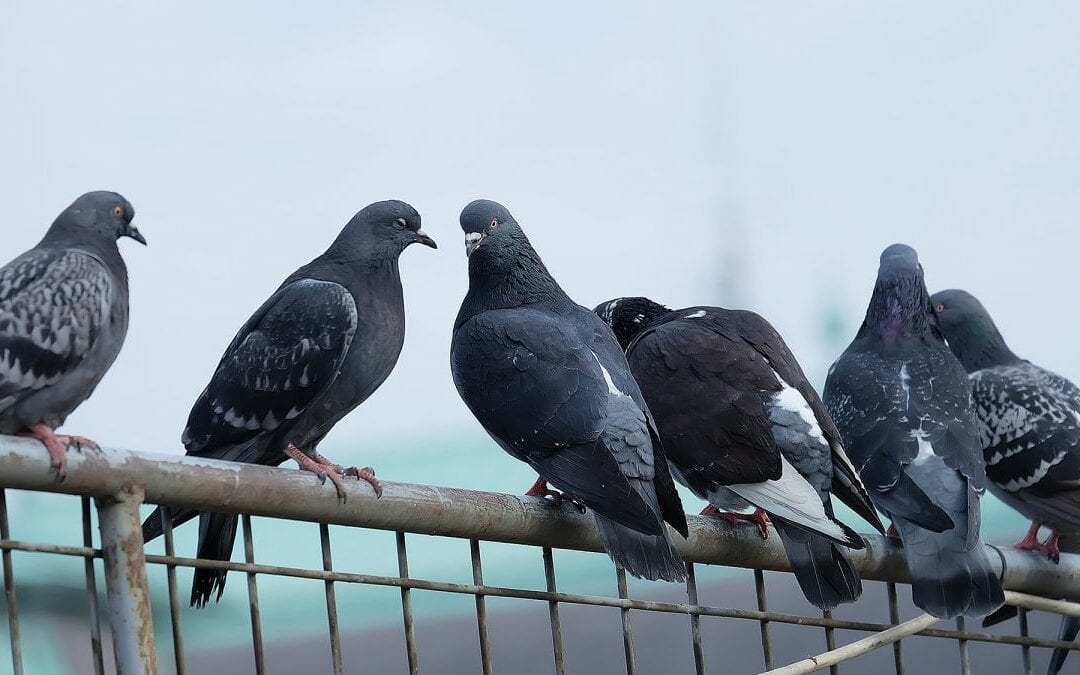
by Pigeon Patrol | Jul 19, 2021 | Bird Netting, Bird Spikes, Columbidae, Doves, pet bird, Pigeon Control
Homing pigeons are called messenger pigeons when they are used to carry messages. Messages have to be written on light, thin paper (such as cigarette paper) and rolled into a small tube that is attached to the bird’s leg. This is called “pigeon post.”

They have also been used to carry small light-weight packages, in including smuggling drugs into prisons.
RACING
In recent history, they are mainly used for the sport of pigeon racing. They have been bred for racing and can reach speeds between 60 – 80 miles per hour. They can fly up to 80 to 600 miles in one single day.
In 2010, Jose Ledesma’s pigeons finish a personal racing season in Canary Islands with amazing resultss. Two young birds raced 3 times each from African coast in Morocco. Long Distance Races + 1st Regional Price against 1312 pigeons (National race equivalent in Belgium). Jose made an amazing movie of these pigeons flying over mountains, seas and deserts: http://www.youtube.com/watch?v=IAGKflxwxwI … Further information can be found on his website: http://www.joseledesma.com/ – J. Ledesma, Tenerife – Canary Islands
THE CARRIER OF MESSAGES
During the Franco-Prussian War of 1870–1871, the Prussians had surrounded the city of Paris preventing mail from entering or leaving the city. During the course of the siege, pigeons and mail were regularly taken out of Paris by hot-air balloons. The letters that were sent to Paris were first reduced in size by photography, so that 30,000 letters could be carried on film placed inside a canister. These canisters were attached to pigeons and these birds then flew into Paris. Thirty-five birds carried the same letters, so that if any were shot down, at least one would reach Paris. In Paris, the film was projected on a screen, and the letters were copied by hand and delivered to homes in the city.
These birds have been used to transport short messages across long distances. In fact, historically well-known leaders, such as Julius Caesar and Genghis Khan, have used them to carry important messages across long distances.
One of the world’s best known news agencies, Reuters, started its European business by using 45 trained birds to carry financial news on the continent in 1850. They carried the latest news and stock prices from Aachen in Germany to Brussels in Belgium, travelling the 76 miles in a record-breaking two hours – beating the railway by four hours.
The Chinese used them to deliver mail as long ago as 1000 B.C.
Source
Pigeon Patrol Products & Services is the leading manufacturer and distributor of bird deterrent (control) products in Canada. Pigeon Patrol products have solved pest bird problems in industrial, commercial, and residential settings since 2000, by using safe and humane bird deterrents with only bird and animal friendly solutions. At Pigeon Patrol, we manufacture and offer a variety of bird deterrents, ranging from Ultra-flex Bird Spikes with UV protection, Bird Netting, 4-S Bird Gel and the best Ultrasonic and audible sound devices on the market today.
Voted Best Canadian wholesaler for Bird Deterrent products ten years in a row.
Contact us at 1- 877– 4– NO-BIRD, (604) 585-9279 or visit our website at www.pigeonpatrol.ca
Pigeon/Pigeon Patrol / Pigeons Roosting / Vancouver Pigeon Control /Bird Spikes / Bird Control / Bird Deterrent / Pigeon Deterrent? Surrey Pigeon Control / Pest /Seagull deterrent / Vancouver Pigeon Blog / Birds Inside Home / Pigeons in the cities / Ice Pigeons/ What to do about pigeons/ sparrows , Damage by Sparrows, How To Keep Raccoons Away, Why Are Raccoons Considered Pests/ De-fence / Pigeon Nesting/ Bird Droppings / Pigeon Dropping/ woodpecker control/ Professional Bird Control Company/ Keep The Birds Away/ Birds/rats/ seagull/pigeon/woodpecker/ dove/sparrow/pidgeon control/pidgeon problem/ pidgeon control/flying rats/ pigeon Problems/ bird netting/bird gel/bird spray/bird nails/ bird guard
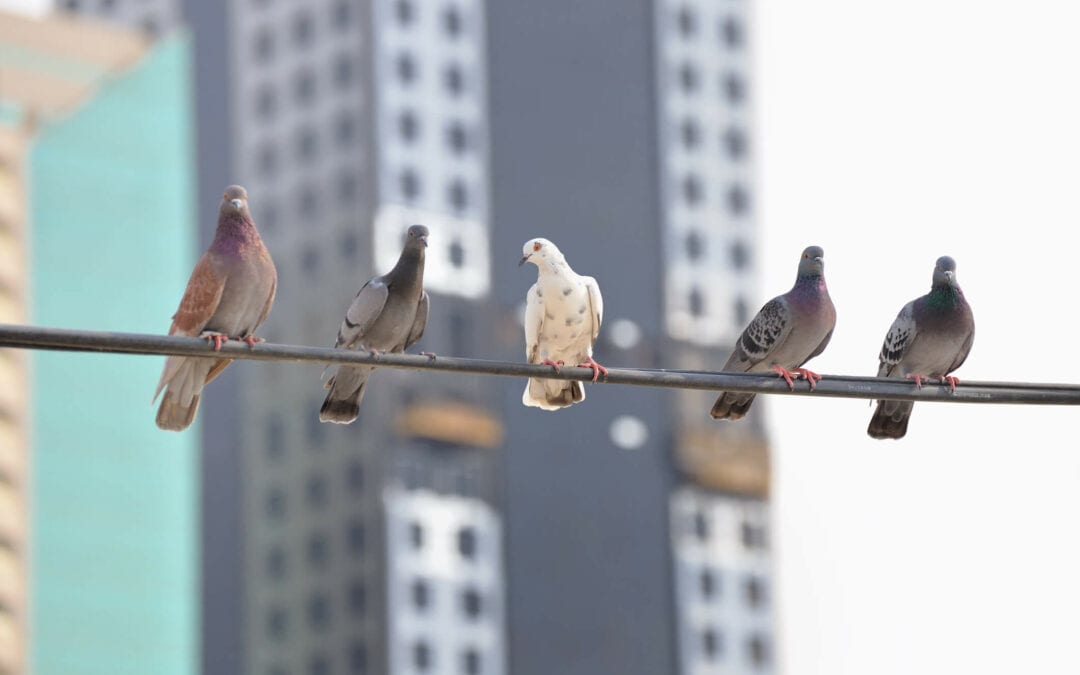
by Pigeon Patrol | Jul 19, 2021 | Animal Deterrent Products, Bird Deterrent Products, Bird Law, Bird Netting, Bird Spikes, Columbidae
Broadband is the most modern of communication means, while carrier pigeons date back to Roman times.
But on Thursday, a race between the two highlighted the low speeds of rural broadband in the UK; the pigeon won.
Ten USB key-laden pigeons were released from a Yorkshire farm at the same time a five-minute video upload was begun.
An hour and a quarter later, the pigeons had reached their destination in Skegness 120km away, while only 24% of a 300MB file had uploaded.
Campaigners say the stunt was being carried out to illustrate that broadband in some parts of the UK is still “not fit for purpose”.
It is not the first time that such a race has taken place. Last year a similar experiment in Durban, South Africa saw Winston the pigeon take two hours to finish a 96km journey. In the same time just 4% of a 4GB file had downloaded.
The pigeons are expected to complete a 120km journey to Skegness in around two hours, but Tref Davies, who is organising the stunt to give publicity to the campaign for better rural broadband, said the broadband connection will take significantly longer to transfer the 300MB file.
“The farm we are using has a connection of around 100 to 200 Kbps (kilobits per second),” Tref Davies, the stunt’s organiser, told BBC News on Thursday morning.
“The kids need to do school work and the farmer has to submit online forms but the connection is not fit for purpose.”
Mr Davies, who is co-founder of business ISP Timico and serves on the board of ISPA (Internet Service Providers’ Association), believes the issue is one that industry and government needs to address.
“This is the UK. It should be well-connected but around a third of homes still can’t get broadband,” he said.
However, BT disputes his figures. A spokesperson said that 99% of homes could now get broadband, leaving an estimated 160,000 lines “where excessive line length means broadband won’t work”.
Even among those who can get broadband, rural areas are fighting to get reasonable speeds.
Research commissioned by the BBC last year found that around three million homes in the UK had internet connections of below 2Mbps (megabits per second).
The government has committed to delivering a minimum of 2Mbps to every home by 2015.
However, a recent report by communications watchdog Ofcom found that while these “headline speeds” were on the rise, they are not the relevant measure for broadband customers.
According to the report, “although headline speeds increased by nearly 50% between April 2009 and May 2010, actual speeds delivered increased by just 27%, and averaged just 46% of headline speeds”.
Lloyd Felton, founder of the Rural Broadband Partnership, said the effort to draw attention to rural broadband deprivation and low speeds was laudable.
“It’s true that there are particular areas of the country that suffer much more than others,” Mr Felton told BBC News.
“You’ve got massive deprivation – this long-quoted ‘digital divide’. As we all get more dependent on the internet, that divide gets wider.
“In the end it’s who takes ownership and responsibility for co-ordinating how a parish is going to handle it – what we say is that ‘communities need to help themselves to broadband’.”
Source
Pigeon Patrol Products & Services is the leading manufacturer and distributor of bird deterrent (control) products in Canada. Pigeon Patrol products have solved pest bird problems in industrial, commercial, and residential settings since 2000, by using safe and humane bird deterrents with only bird and animal friendly solutions. At Pigeon Patrol, we manufacture and offer a variety of bird deterrents, ranging from Ultra-flex Bird Spikes with UV protection, Bird Netting, 4-S Bird Gel and the best Ultrasonic and audible sound devices on the market today.
Voted Best Canadian wholesaler for Bird Deterrent products ten years in a row.
Contact us at 1- 877– 4– NO-BIRD, (604) 585-9279 or visit our website at www.pigeonpatrol.ca
Pigeon/Pigeon Patrol / Pigeons Roosting / Vancouver Pigeon Control /Bird Spikes / Bird Control / Bird Deterrent / Pigeon Deterrent? Surrey Pigeon Control / Pest /Seagull deterrent / Vancouver Pigeon Blog / Birds Inside Home / Pigeons in the cities / Ice Pigeons/ What to do about pigeons/ sparrows , Damage by Sparrows, How To Keep Raccoons Away, Why Are Raccoons Considered Pests/ De-fence / Pigeon Nesting/ Bird Droppings / Pigeon Dropping/ woodpecker control/ Professional Bird Control Company/ Keep The Birds Away/ Birds/rats/ seagull/pigeon/woodpecker/ dove/sparrow/pidgeon control/pidgeon problem/ pidgeon control/flying rats/ pigeon Problems/ bird netting/bird gel/bird spray/bird nails/ bird guard
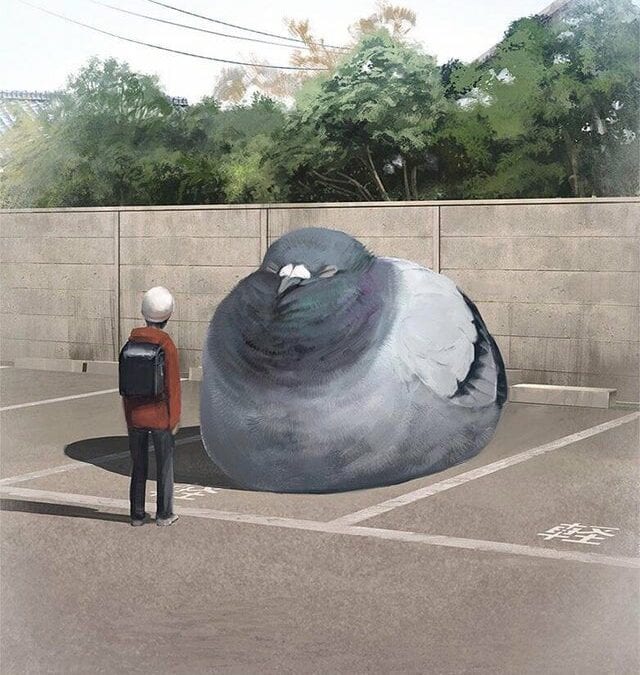
by Pigeon Patrol | Jul 12, 2021 | Bird Deterrent Products, Bird Law, Bird Netting, Bird Spikes, Columbidae, Doves
ST. PAUL, Minn.–Pounded and strained by heavy traffic and weakened by missing bolts and cracking steel, the failed interstate bridge over the Mississippi River also faced a less obvious enemy: Birds, specifically pigeons.
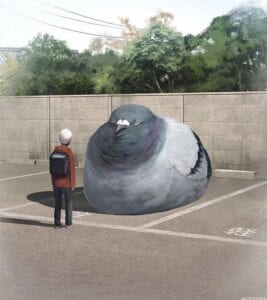
Inspectors began documenting the build-up of pigeon dung on the span near downtown Minneapolis two decades ago.
Experts say the corrosive guano deposited all over the bridge’s framework helped the steel beams rust faster.
Although investigators have yet to identify the cause of the bridge’s Aug. 1 collapse, which killed at least 13 people and injured about 100, the pigeon problem is one of many factors that dogged the structure.
“There is a coating of pigeon dung on steel with nest and heavy build-up on the inside hollow box sections,” inspectors wrote in a 1987-1989 report.
In 1996, screens were installed over openings in the bridge’s beams to keep pigeons from nesting there, but that didn’t prevent the build-up of droppings elsewhere.
Pigeon droppings contain ammonia and acids, said chemist Neal Langerman, of the American Chemical Society. If the dung isn’t washed away, it dries out and turns into a concentrated salt. When water gets in and combines with the salt and ammonia, it creates small electrochemical reactions that rust the steel underneath.
“Every time you get a little bit of moisture there, you wind up having a little bit of electrochemistry occurring and you wind up with corrosion,” said Langerman. “Over a long term, it might in fact cause structural weaknesses.”
Langerman emphasized that he wasn’t saying absolutely that pigeon dung factored into the collapse of the bridge, but the problem is familiar to bridge inspectors everywhere.
The Colorado Department of Transportation spent so much time cleaning pigeon manure off bridges that it’s researching new ways to keep the birds away from its spans.
Source
Pigeon Patrol Products & Services is the leading manufacturer and distributor of bird deterrent (control) products in Canada. Pigeon Patrol products have solved pest bird problems in industrial, commercial, and residential settings since 2000, by using safe and humane bird deterrents with only bird and animal friendly solutions. At Pigeon Patrol, we manufacture and offer a variety of bird deterrents, ranging from Ultra-flex Bird Spikes with UV protection, Bird Netting, 4-S Bird Gel and the best Ultrasonic and audible sound devices on the market today.
Voted Best Canadian wholesaler for Bird Deterrent products ten years in a row.
Contact us at 1- 877– 4– NO-BIRD, (604) 585-9279 or visit our website at www.pigeonpatrol.ca
Pigeon/Pigeon Patrol / Pigeons Roosting / Vancouver Pigeon Control /Bird Spikes / Bird Control / Bird Deterrent / Pigeon Deterrent? Surrey Pigeon Control / Pest /Seagull deterrent / Vancouver Pigeon Blog / Birds Inside Home / Pigeons in the cities / Ice Pigeons/ What to do about pigeons/ sparrows , Damage by Sparrows, How To Keep Raccoons Away, Why Are Raccoons Considered Pests/ De-fence / Pigeon Nesting/ Bird Droppings / Pigeon Dropping/ woodpecker control/ Professional Bird Control Company/ Keep The Birds Away/ Birds/rats/ seagull/pigeon/woodpecker/ dove/sparrow/pidgeon control/pidgeon problem/ pidgeon control/flying rats/ pigeon Problems/ bird netting/bird gel/bird spray/bird nails/ bird guard









